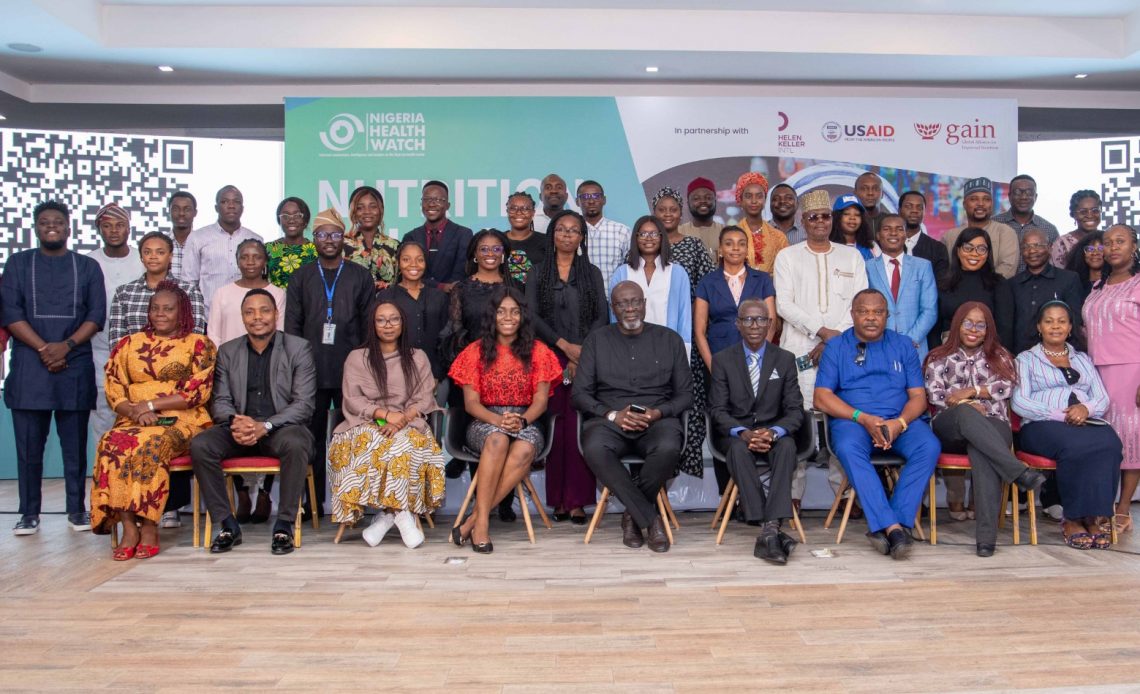By Dabri Olohije and Safiya Shuaibu Isa (Lead Writers)
The effects of climate change on food insecurity are direct and substantial. Food production is becoming increasingly challenging and unpredictable as global temperatures increase because of shifts in weather patterns, extreme weather events, and environmental disruptions. Although the indices of hunger started improving in 1990, these indices have declined since 2015. Hunger and poor nutrition account for nearly half of all deaths in children under five globally. In Nigeria, one in 10 children die from hunger before the age of five, and an estimated 25 million people are at risk of food insecurity.
Climate change poses a challenge to achieving Sustainable Development Goals (SDGs) two — Zero Hunger, and three — Good Health and Well-being, as food production heavily relies on climatic factors like rainfall, temperature, and humidity. While the connection between food security and nutrition is widely discussed, it is crucial to include climate change in these discussions due to its impact on global nutrition indicators in recent years.
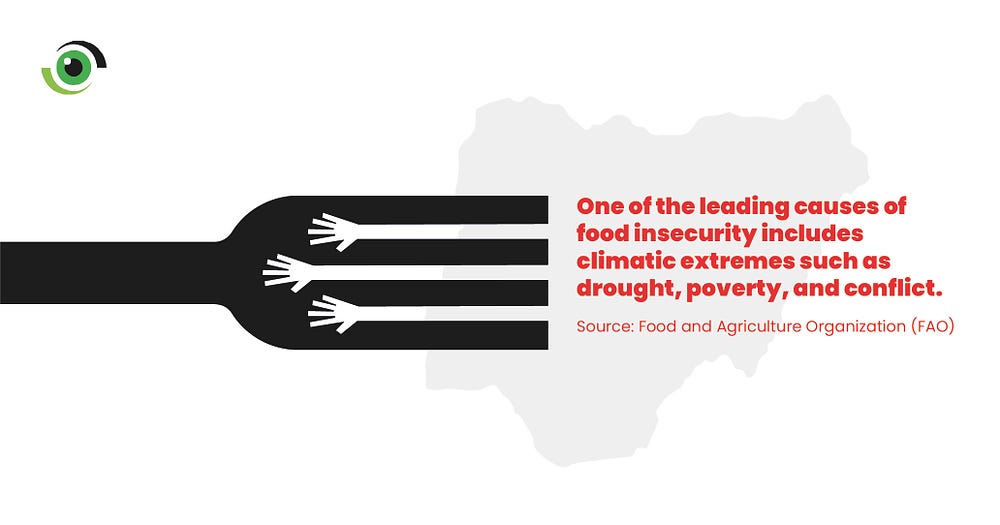
Understanding the link between climate change and nutrition outcomes
Recognising the urgency of addressing the intrinsic link between climate change and nutrition, Nigeria Health Watch convened a policy dialogue with the, “Strengthening Nutrition Outcomes in the Face of Climate Change.” The event brought together stakeholders from various sectors, including federal ministries and development agencies, to discuss the impact of climate change on nutrition.
Opening the discussions, Vivianne Ihekweazu, Managing Director, Nigeria Health Watch, expressed the dangers of overlooking the impact of climate change not just on health and well-being but on nutrition outcomes. “Hunger and poor nutrition continue to be a very pressing global issue and have claimed many lives not just in Nigeria but around the world. The impact of climate change will continue to compound our ability to achieve the Sustainable Development Goals,” she said.
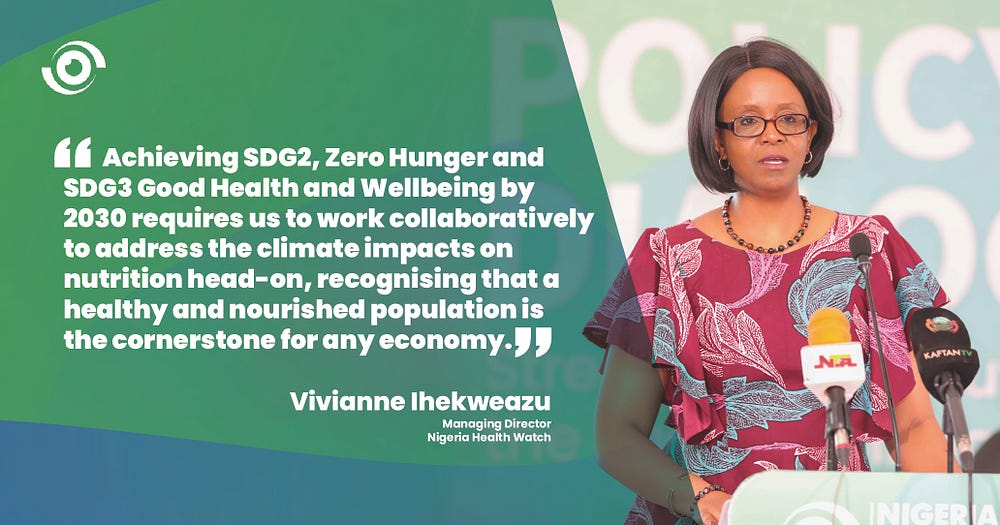
Ihekweazu highlighted the importance of partnerships and collaboration and their critical role in improving nutrition outcomes and driving overall economic development. This underscored the significance of the policy dialogue, which aimed to foster strong linkages and collaboration between relevant sectors to implement multisectoral, climate-resilient food and nutrition programmes and interventions, drawing on the experiences of stakeholders.
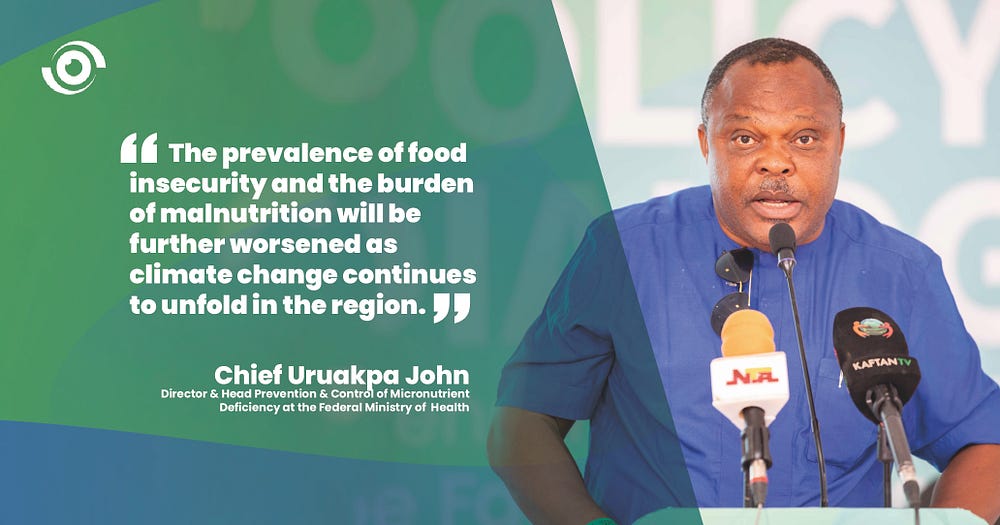
Climate change has the potential to disrupt agricultural productivity, alter ecosystems, and undermine food production systems, exacerbating existing challenges related to food security and nutrition. In his keynote address, Chief John Uruakpa, Director and Head, Prevention and Control of Micronutrient Deficiency at the Federal Ministry of Health, stated that “the prevalence of food insecurity and the burden of malnutrition will be further worsened as climate change continues to unfold in Nigeria.” He added that globally, Africa faces worse nutrition and food insecurity outcomes.
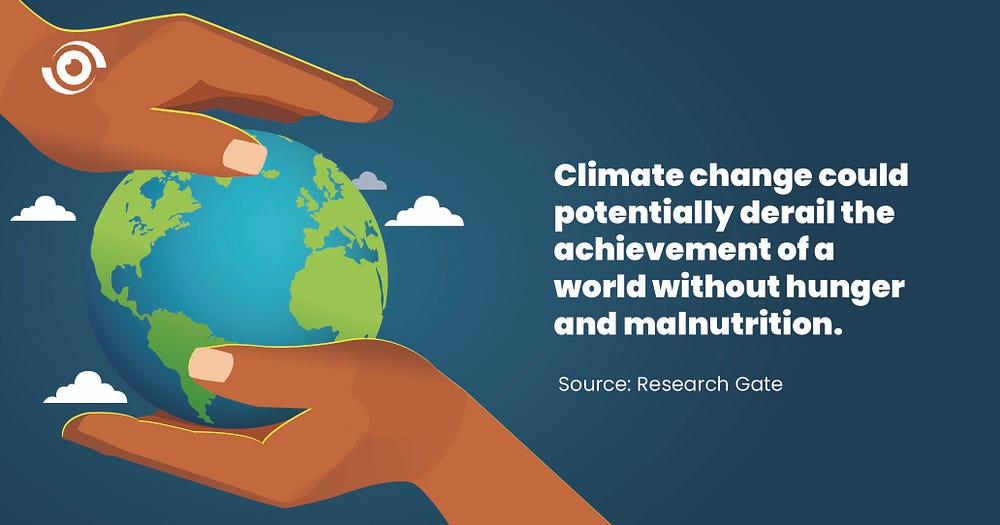
The National Climate Change Act supports the implementation of measures to curb the impact of climate change on food production, and one key point that emerged from Chief Uruakpa’s address was the Nigerian Government’s commitment to addressing the impact of climate change in the country.
Exploring an enabling environment for the integration of climate change, food security and nutrition policies for improved nutrition outcomes.
The first panel discussion explored the critical need for a supportive framework that foster the integration of these interconnected issues. The panellists, representing various developmental agencies and non-profit organisations focused on nutrition and food security and extensively discussed the integration of climate change into the design and implementation of nutrition programmes.
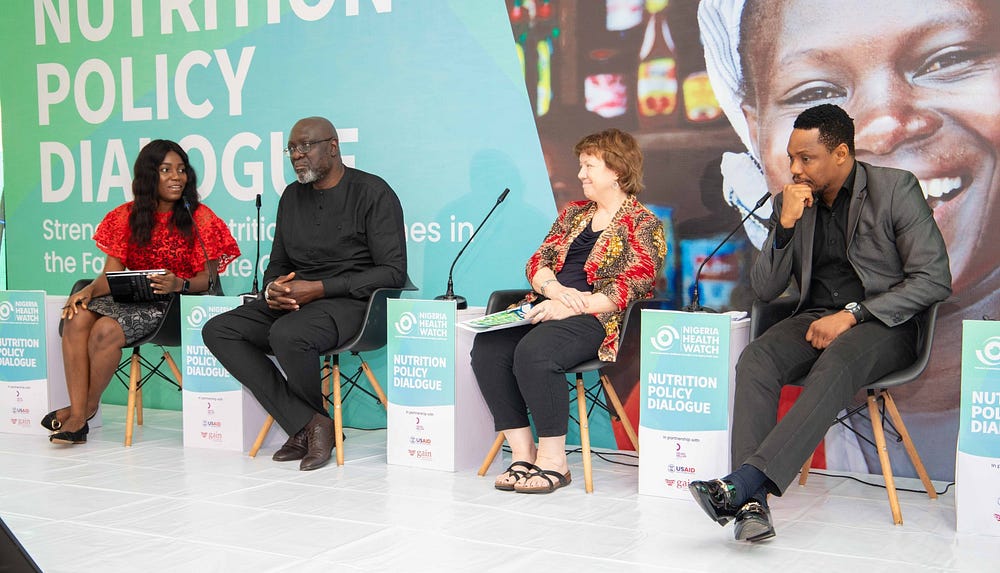
Dr Michael Ojo, Country Director, Global Alliance for Improved Nutrition (GAIN), discussed GAIN’s efforts to secure and promote the co-benefits between nutrition and environmental sustainability. “We brought hundreds of public-private partners together to tackle post-harvest loss because 40% of the food that we produce is either lost or wasted between the farm and the table”.
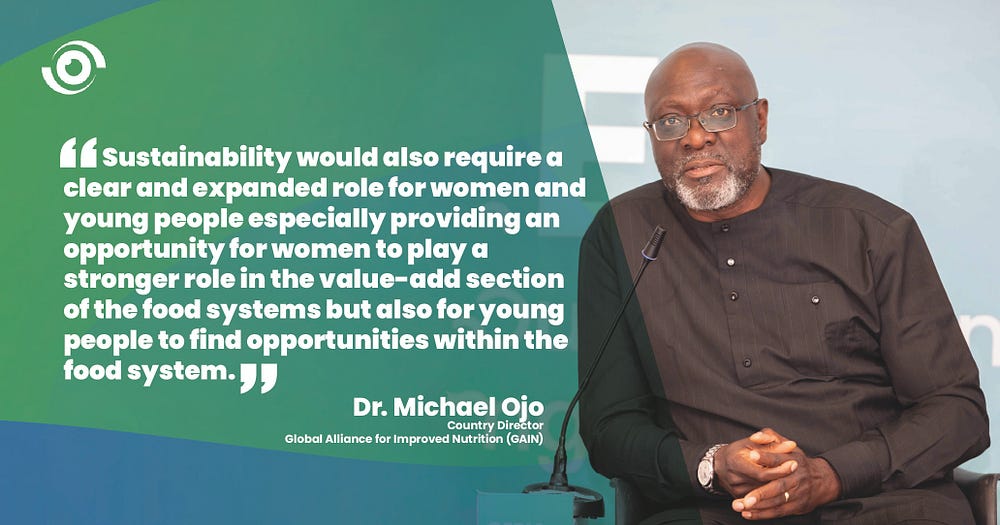
He stressed the importance of exploring innovative financing mechanisms to mobilise resources for climate change adaptation, agricultural development, and nutrition interventions. These include leveraging public-private partnerships, exploring climate finance opportunities, and promoting investments in sustainable agriculture and nutrition.
Access to clean water, proper sanitation facilities, and hygiene practices directly impact nutritional outcomes, particularly in vulnerable populations such as children and women. Dr Jane Bevan, Chief WASH Section at the United Nations Children’s Fund (UNICEF) Nigeria office, discussed the interconnectedness of Water, Sanitation and Hygiene (WASH), climate change, nutrition and overall well-being. She highlighted how WASH programmes at UNICEF strategically incorporate nutrition interventions into their implementation, enabling targeted interventions to tackle the multifaceted challenges of climate change.

The panel also addressed the role of women and the importance of creating an enabling environment through supportive laws, regulations, and policies to sustain nutrition interventions. According to Dr Ojo, the main challenge is the effective implementation of policies. He stated, “Sustainability would depend on a whole range of things, including ensuring women have roles to play and in terms of enabling environment and policies”.
Dr Chukwuma Anene, Senior Programme Officer, USAID Advancing Nutrition programme, echoed the concerns about policy implementation challenges and highlighted other persistent gaps in addressing sustainability. Insufficient mainstreaming, inadequate integration of climate change considerations into food security, limited capacity to interpret policies, and a lack of comprehensive data were identified as key obstacles. “We have inadequate institutional and human capacity…we don’t have enough evidence-based data that would be a necessary action for policy development and decision making,” he said. Dr Anene also stressed the importance of sustainable financing while also urging the government and policymakers to allocate and release adequate funding for climate change and nutrition issues to ensure the successful implementation of integrated policies and programmes.
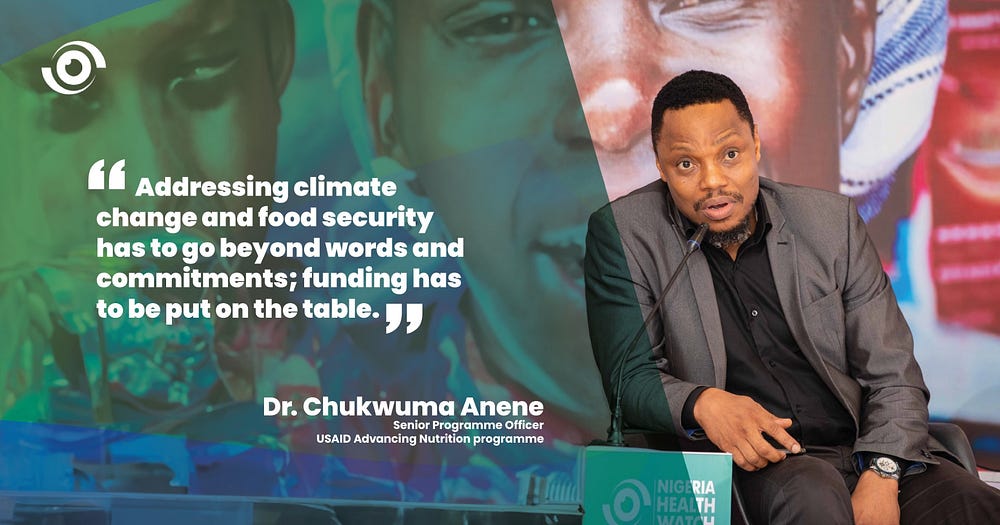
Showcasing innovations in climate-resilient agriculture and high-impact nutrition products for better outcomes
From climate-resilient farming practices to novel high-impact nutrition initiatives, the second panel explored the power of innovation in shaping sustainable and nourishing futures. Human-centred approaches emerged as a critical theme in this panel session. Highlighting the link between climate change and maternal nutrition, Hope Ikani, Programme Officer, Civil Society Scaling-Up Nutrition in Nigeria (CS-SUNN), said, “We advocate for the use of Multiple Micronutrient Supplement (MMS) so that communities that are affected by maternal nutrition can benefit.”
Relating climate change to exclusive breastfeeding, Dr James Oloyede, Nutrition Adviser, Alive and Thrive, FHI 360, said that the initiative promotes exclusive breastfeeding to reduce the number of children being fed with commercially produced breast milk substitutes. This innovative initiative focuses on improving nutrition outcomes and addresses the environmental implications associated with the production and disposal of baby formula.
Dr Michael Adegboye, Deputy Director, Federal Ministry of Agriculture and Rural Development (FMARD) highlighted the detrimental impact of inorganic fertilisers on soil nutrients, which adversely affects both nutrition outcomes and climate actions. “Many of the fertilisers being used introduce a poison to the soil, adding to the problem of climate change,” he said, adding that FMARD has implemented certain mitigating measures, such as promoting the cultivation of short-term crops that are resilient to changing rain patterns. These initiatives aim to address the negative consequences of inorganic fertilisers and promote sustainable agricultural practices.
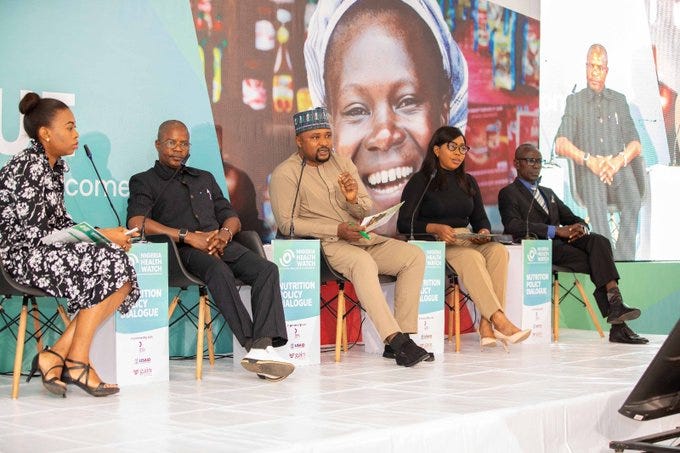
Dr. Michael Daniel Eveshoyan, the Technical Advisor, Nutrition/Food Systems for the USAID Advancing Nutrition programme implemented by Helen Keller International, discussed the organisation’s multi-sectoral approach to implementing nutrition programmes in Nigeria. Helen Keller International implements these programmes using a multi-sectoral approach. They focus on nutrition-specific and nutrition-sensitive interventions, provide vitamin A supplementation and train health workers and nutrition focal persons for nutrition-specific efforts. In nutrition-sensitive interventions, they improve agricultural practices and offer bio-fortified food crops to communities.
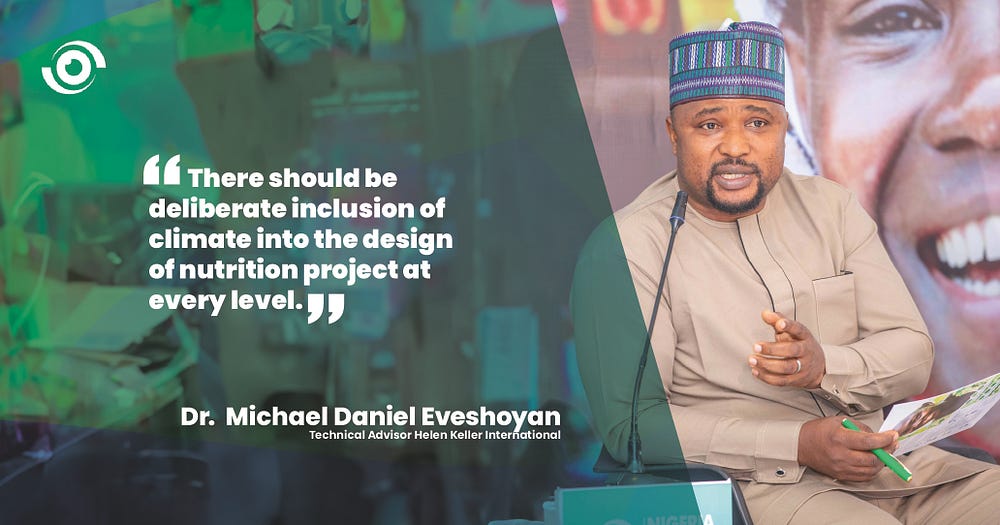
Tackling the climate-food-nutrition crisis: A white paper presentation
The dialogue highlighted the urgent need for a holistic and inclusive approach to address the impact of climate change on nutrition outcomes in Nigeria. It emphasised the importance of awareness, capacity building, leadership, evidence, empowerment, legislative action, and stakeholder collaboration.
A white paper was presented to round up the discussion. This will provide strategic insights to develop a roadmap for a comprehensive framework for action. The highlighted recommendations include:
- Multi-level sensitisation campaigns: Develop and implement comprehensive awareness campaigns to raise awareness about the linkages between climate change, food production, and nutrition, emphasising sustainable practices and healthy dietary choices.
- Farmer capacity building: Strengthen the capacity of farmers through training programmes and extension services that promote climate-resilient and sustainable agricultural practices.
- Leadership development: Invest in leadership development programmes that empower government officials, community leaders, and civil society representatives to prioritise and advocate for climate-resilient and nutrition-sensitive policies.
- Evidence generation and dissemination: Support research initiatives that enhance the understanding of the specific impacts of climate change on nutrition outcomes in Nigeria.
- Youth and women empowerment: Create opportunities for youth and women to actively participate in climate change adaptation and nutrition initiatives.
- Legislative measures: Advocate for legislation and policies that promote using renewable energy sources and discourage reliance on fossil fuels.
- Stakeholder collaboration: Foster collaboration and coordination among government agencies, private sector entities, civil society organisations, research institutions, and communities.


